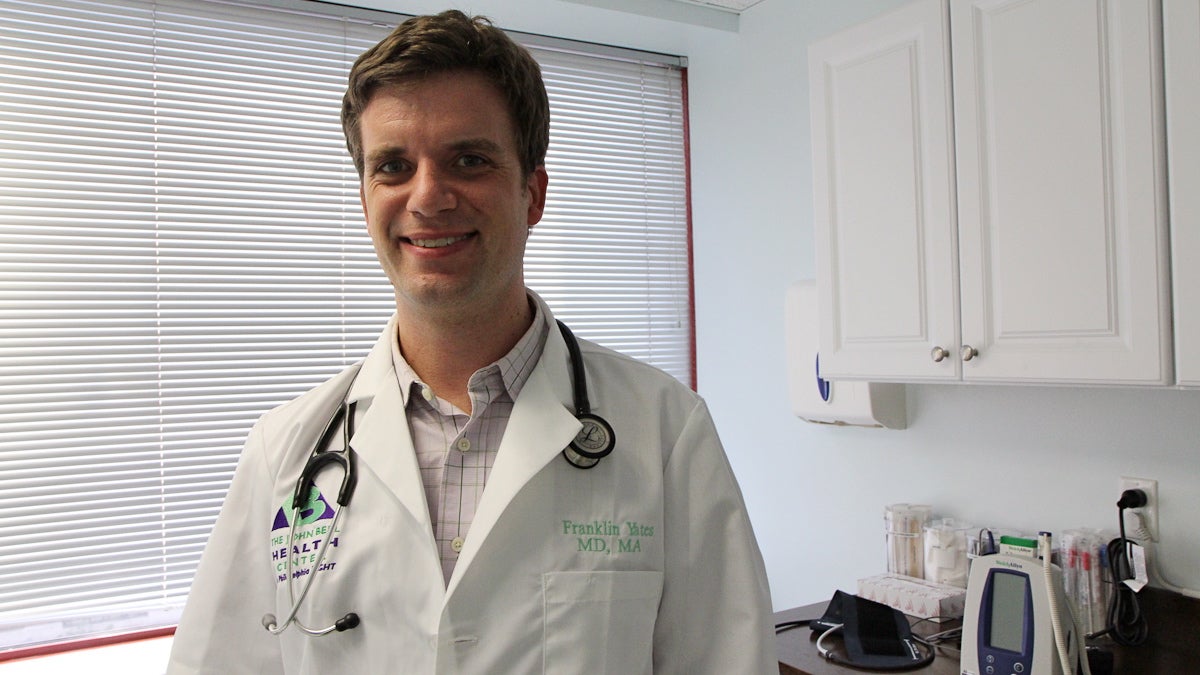Clinic geared toward health needs of ex-offenders opens in Philly
Listen
Dr. Franklin Yates works at Philadelphia FIGHT's John Bell Health Center, a new clinic focused on the needs of ex-offenders. (Kimberly Paynter/WHYY)
A rather unusual health clinic has opened in Philadelphia. It’s specifically geared toward ex-offenders and people leaving jail or prison.
Open for just two weeks, the John Bell Health Center is sparsely decorated. The paint is still fresh on the walls. Some prison health pamphlets are spread across the check-in counter. Dr. Franklin Yates says only a few patients have come through so far, but he’s already seen a trend.
“Coming in right off the bat, they have a list of five, six medical problems that need to be addressed on the first patient visit,” he says.
Largely known for its work in HIV, Philadelphia FIGHT is running the clinic in a former counseling and testing space in its Center City building. The project, in the works for two years, involved ongoing conversations with local and state prison representatives. It’s partly funded out of a $500,000 federal community health center grant and comes on the heels of other changes at FIGHT.
Leaders say the clinic is open to anyone, but began largely in response to the disproportionate burden of chronic diseases among ex-offenders and a consequent lack of supports.
“These are communities of folks with limited access to health care infrastructure, for whom there’s a lot of life crisis and things happening where access to medical care may not be a priority,” says Hannah Zellman, director of FIGHT’s Institute for Community Justice, which has worked for a decade on prison issues.
Zellman says a lot of socioeconomic factors — poverty, housing instability and substance abuse — and stigma contribute to high rates of hepatitis, diabetes, HIV, heart disease and other health problems among those who’ve been incarcerated. As one example, a recent study found that nearly 20 percent of people entering Pennsylvania’s prison system screened positive for hepatitis C, compared with a rate of less than 2 percent among the general population.
Conversely, jail or prison may actually mark the very first time someone even sees a doctor, Zellman explains. “Folks might have conditions that get stabilized inside.”
But while people with HIV may have access to specialized health programs once they leave, whether that’s insurance or prescription assistance, such does not exist for ex-offenders in general. What that means, says Zellman, is that for many, “their health will deteriorate when they come home.”
Prescriptions go unfilled.
The risk of death, even in those first couple weeks, is much higher, with many falling through the cracks and winding up in emergency care.
Yates and others hope to better address these problems with a heightened sensitivity to these dynamics and being prepared to deal, at that first visit, with a host of complex issues.
“I see myself telling the patient to come back in a week, and again in another week, as opposed to a general well patient who has to come back in a year or six months,” he says.
Mental health and benefits specialists will be on hand. Conversations about housing and food will be routine. Philadelphia FIGHT’s executive director, Jane Shull, says that while the place may not be busy yet, it will be once a flood of anticipated referrals start coming in.
“We know that the need is enormous,” she says. “We had a meeting with people from the Philadelphia prison system a few months ago to see how they felt about it, and as a joke one of the people said, ‘Oh, we’re going to send you 11,000 people tomorrow.'”
Shull says the goal in the first year is to care for about 1,500 patients.
As for the nearly bare walls, the clinic has plans to soon change that, with framed portraits of patients accompanied by essays. Behind the check-in counter, Shull explains, will be a plaque featuring what she describes as the most important saying from John Bell, an HIV/AIDS and prisoner advocate for whom the center is named.
“Half of your rights haven’t been written yet because you haven’t been there to demand them,” Bell said.
The project has been in the works for two years, and involved ongoing conversations with the local and state prison representatives. It’s partly funded out of a $500,000 federal community health center grant and comes on the heels of other changes at FIGHT. The new clinic is housed in the former counseling and testing space. Meanwhile, the agency received a federal community health center designation, and is preparing to expand its young adult general medicine clinic.
WHYY is your source for fact-based, in-depth journalism and information. As a nonprofit organization, we rely on financial support from readers like you. Please give today.

